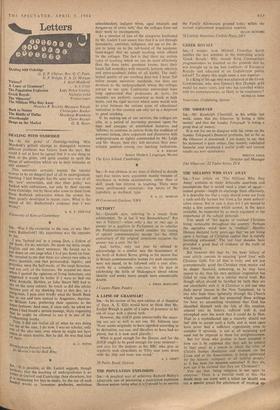is possible, as Mr. Laslett suggests, though linlIk ely that the
teaching of undergraduates is no better at Oxford and Cambridge than elsewhere, but it is misleading for him to imply, by the use 'of such loaded words as 'immature graduates, ambitious
schoolmasters, indigent wives, aged retainers and hangers-on of every sort,' that the colleges farm out their work to incompetents.
As a member of one of the categories lambasted by Mr. Laslett I can assure him that it is not through immaturity, ambition, indigence, old age or the de- sire to jump on to the tail-board of the academic band-wagon that we accept teaching work offered by the colleges. The fact is that there are certain types of teaching which we can do more effectively than the dons (who, goodness knows, have their hands full nowadays with research, lectures, tutorials and extra-academic duties of all kinds). The intel- lectual quality of our teaching does not, I hope. fall below proper university standards; nor does our devotion to the undergraduates whom the colleges entrust to our care. Continental universities have long appreciated that professeurs de lyctle, for example, are perfectly competent to teach at high levels, and the rigid barriers which some would seek to erect between the various types of educational- institution in this country can only `act as a deterrent to good teaching.
If, by making use of our services, the colleges are able, in a period of increasing pressure upon the time and energies of established lecturers and 'fellows.', to continue in certain fields the tradition of personal tuition, close argument and discussion with undergraduates so rightly commended by Mr. Leigh and Mr, Moore, then they will maintain their unas- sailable position . among our teaching institutions. N. P. WRIGHT Senior Modern Languages Master The Leys School, Cambridge


































 Previous page
Previous page